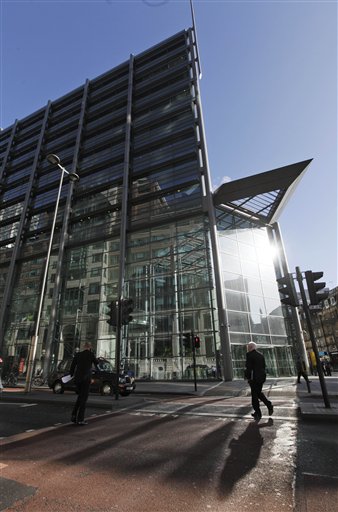LONDON (AP) — Britain pressed ahead Tuesday with a fresh wave of restructuring in its crisis-ravaged banking system, as Lloyds Banking Group PLC sought at least 21 billion pounds ($34.2 billion) through a record share issue and debt swap.
Royal Bank of Scotland gets a further 25.5 billion pounds from the government — all at once, instead of in stages as announced in February — and the government’s share stake in RBS will rise from 70 percent to 84 percent.
Both of the bailed-out banks will sell assets to comply with conditions for state aid.
The government also granted tax changes worth up to 11 billion pounds to RBS, and it will spend 5.7 billion pounds to buy its share of the new Lloyds shares. And the Treasury set aside a further 8 billion pounds to support RBS if its position deteriorates badly.
The moves will further stabilize the banks, reduce risks to taxpayers, and increase competition, the government says. Britain took stakes in the banks as part of earlier bailouts.
Treasury chief Alistair Darling said the latest deal reduced the Treasury’s potential insurance liabilities by more than 300 billion pounds. The government is also collecting 2.5 billion pounds fee from Lloyds for the benefit of being a potential subscriber to the insurance program.
Both banks agreed to curbs on bonuses.
Market reaction for Lloyds was positive at first, but at midday shares were down 0.75 percent at 84.36 pence on the London Stock Exchange.
It was another story with RBS, whose share fell 10 percent to 34.76 pence, the lowest since July 9.
“The news is potentially good for both U.K. consumers and rival banking groups, although more debatable for both Lloyds and RBS shareholders,” said Keith Bowman, analyst at Hargreaves Lansdown Stockbrokers.
“UK consumers will in theory enjoy increased choice and lower pricing, while rivals such as HSBC will be glad to see their rivals paying for their mistakes.”
Lloyds said it would seek to raise a record 13.5 billion pounds through a rights issue, surpassing the 12.5 billion pounds raised in March by HSBC and the 12.3 billion pounds raised by RBS in mid-2008, the two previous records. Lloyds said it would also raise at least 7.5 billion pounds from an exchange of debt.
Lloyds, which was also bailed out by taxpayers at the height of the financial crisis, said it would not be subscribing to a government insurance program against losses on toxic assets — a move that will keep the public’s stake in the bank at 43.4 percent after the government takes its part of the rights issue.
Elsewhere, Lloyds said it had a “good revenue performance” in the third quarter and had pared costs by 2 percent so far this year. However, it still expects a full-year loss.
Lloyds’ problems stem from its hastily consummated rescue-takeover of Halifax/Bank of Scotland in January.
“The integration of HBOS is proceeding well and cost synergies are coming through faster than expected,” said Jonathan Jackson, head of equities at Killik & Co., noting that Lloyds expects full-year savings of about 750 million pounds, up 50 million pounds from previous guidance.
RBS will sell its branch network in England and Wales and NatWest branches in Scotland, and also dispose of RBS Insurance, Global Merchant Services and its stake in RBS Sempra Commodities within four years to meet European Union conditions for receiving state aid.
Lloyds said it would dispose of its TSB brand, Scottish TSB branches and some other TSB branches in England and Wales. It will also sell the branches, savings accounts and branch-based mortgages of its Cheltenham & Gloucester unit.
Lloyds’ Chief Executive Eric Daniels told a conference call that the European Commission would have demanded far larger divestitures if the bank had stayed in the insurance program, but he said all the negotiations were based on the assumption that Lloyds wanted out.
“The greatest ‘triumph’ of this entire episode for Lloyds is probably the capitulation by Brussels, possibly assisted by the U.K. government, apparently choosing to give Lloyds special treatment in comparison to all other state-aided banks,” said analysts at Exane BNP Paribas.
“It appears strange that Lloyds is only required to sell (within four years) a selection of assets … all of which it might well have chosen to sell anyway.”
Both banks have agreed not to pay discretionary bonuses for 2009 performance to any employee who earns more 39,000 pounds per year, and members of both boards agreed to defer all bonuses for 2009 until 2012, the Treasury said.
RBS agreed to absorb the first 60 billion pounds of losses covered by the insurance program, compared to the earlier plan to absorb 42 billion pounds in losses. The value of the assets to be insured has been reduced from 325 billion pounds to 282 billion pounds.
RBS has also pledged that its debt will be managed so that the bank ranks no higher than fifth in the combined global debt rankings of banks.
___
On the Net:
UK Treasury, http://www.hm-treasury.gov.uk
Royal Bank of Scotland, http://www.rbs.com
Lloyds Banking Group, http://www.lloydsbankinggroup.com/
Copyright 2009 The Associated Press.








